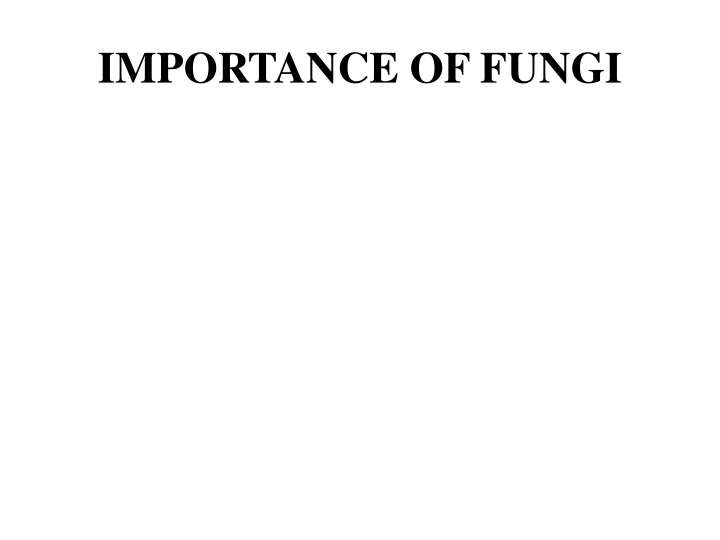
The Significance of Fungi in Nature and Society
Fungi play a crucial role in the environment and economy. They aid in recycling dead materials back into the soil, supporting plant growth, producing antibiotics, controlling crop pests naturally, but can also cause diseases in plants and animals, and humans. Their impact ranges from ecological balance to medical advancements and agricultural practices.
Download Presentation

Please find below an Image/Link to download the presentation.
The content on the website is provided AS IS for your information and personal use only. It may not be sold, licensed, or shared on other websites without obtaining consent from the author. If you encounter any issues during the download, it is possible that the publisher has removed the file from their server.
You are allowed to download the files provided on this website for personal or commercial use, subject to the condition that they are used lawfully. All files are the property of their respective owners.
The content on the website is provided AS IS for your information and personal use only. It may not be sold, licensed, or shared on other websites without obtaining consent from the author.
E N D
Presentation Transcript
Fungi are of great economic importance
responsible for most of the recycling which returns dead material to the soil in a form in which it can be reused. Without fungi, earth would have been covered under piles of dead plant and animal remains.
good growth of most plants, including crops, through the development of the mycorrhizal association. This association enables continued supply of food to all life since plants exist at the base of most food chains.
derived from a common fungus called Penicillium. Many other fungi also produce antibiotic substances, which are now widely used to control diseases in human and animal populations. A fungus which parasitizes Rye crops causes a disease known as Ergot. It produces small hard structures, known as sclerotia. These sclerotia can cause poisoning in humans and animals which have eaten infected material but
the crop pests such as insects (entomophagous) and nematodes (Nematophagous). This method is generally cheaper and less damaging to the environment than using chemical pesticides.
are parasites of plants. Most of our common crop plants are susceptible to fungal attack of one kind or another. An entire field can be lost to fungal attack if not treated with anti fungal agents (fungicides)
animals causing diseases. Fungi also live on and in humans. Athletes foot and candida infections are frequently occurring diseases of human caused by fungi
spoilage. Large losses of stored food with high moisture content are lost to fungi. This occurs more in the tropics. Moulds render infected stored foods inedible.
